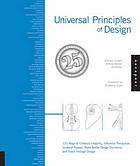documenting the user's task

Read these to prepare for class discussion
-
Universal principles of design
Satisficing, 210 -
a relevant article from the Nielsen Norman Group
Interviewing Users -
Gruen, D., Rauch, T., Redpath, S., & Ruettinger, S. (2002).
The use of stories in user experience design.
International Journal of Human-Computer Interaction, 14(3&4), 503-534.
[PDF]
⇒ Focus on the first two sections, pages 503-511; skim section 3. -
Go, K., & Carroll, J.M. (2004).
The blind men and the elephant: Views of scenario-based system design.
interactions, 11(6), 44-53
[PDF]
⇒ Focus on pages 45-50.
[top]
Optional readings which may come up in class discussions
Carroll, J. M. (2000).
Five reasons for scenario-based design.
Interacting with Computers, 13(1), 43-60.
[PDF]
Diaper, D. (2002).
Discussion: Task scenarios and thought.
Interacting with Computers, 14(5), 629-638.
[PDF]
Sutcliffe, A. (2003).
Symbiosis and synergy? Scenarios, task analysis and reuse of HCI knowledge.
Interacting with Computers, 15(2), 245-263.
[PDF]
Useful, but not available online
Cockburn, A. (2000).
Writing Effective Use Cases.
Reading, MA: Addison-Wesley Professional.
[QA76.76.A65 C63 2001]
⇒ Section 1.1, What is a use case (more or less)?, p1-6
⇒ Section 2.1, Interactions between actors with goals, p23-29
⇒ Section 7.2, Action steps, p90-97
[top]

